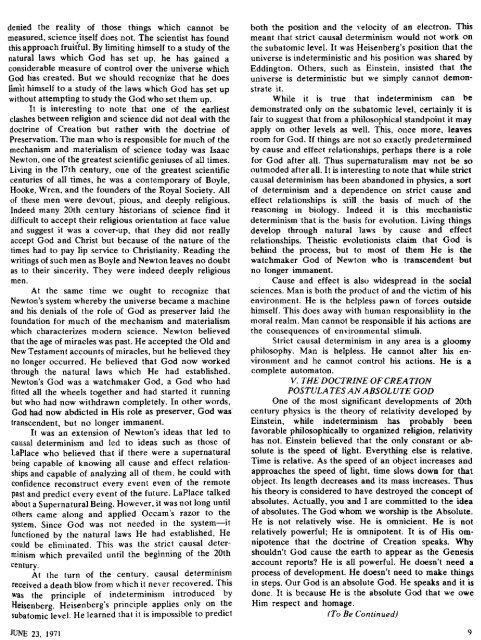Covenanter Witness Vol. 86 - Rparchives.org
Covenanter Witness Vol. 86 - Rparchives.org
Covenanter Witness Vol. 86 - Rparchives.org
Create successful ePaper yourself
Turn your PDF publications into a flip-book with our unique Google optimized e-Paper software.
denied the reality of those things which cannot bemeasured, scienceitself does not. The scientist has foundthis approach fruitful. By limiting himself to a study of thenatural laws which God has set up, he has gained aconsiderable measure of control over the universe whichGod has created. But we should recognize that he doeslimit himself to a study of the laws which God has set upwithout attempting to study the God who set them up.It is interesting to note that one of the earliestclashes between religion and science did not deal with thedoctrine of Creation but rather with the doctrine ofPreservation. The man who is responsible for much of themechanism and materialism of science today was IsaacNewton, one of the greatest scientific geniuses of all times.Living in the 17th century, one of the greatest scientificcenturies of all times, he was a contemporary of Boyle,Hooke, Wren, and the founders of the Royal Society. Allof these men were devout, pious, and deeply religious.Indeed many 20th century historians of science find itdifficult to accept their religious orientation at face valueand suggest it was a cover-up, that they did not reallyaccept God and Christ but because of the nature of thetimes had to pay lip service to Christianity. Reading thewritings of such men as Boyle and Newton leaves no doubtas to their sincerity. They were indeed deeply religiousmen.At the same time we ought to recognize thatNewton's system whereby the universe became a machineand his denials of the role of God as preserver laid thefoundation for much of the mechanism and materialismwhich characterizes modern science. Newton believedthat the age of miracles was past. He accepted the Old andNew Testament accounts of miracles, but he believed theyno longer occurred. He believed that God now workedthrough the natural laws which He had established.Newton's God was a watchmaker God, a God who hadfitted all the wheels together and had started it runningbut who had now withdrawn completely. In other words,God had now abdicted in His role as preserver, God wastranscendent, but no longer immanent.It was an extension of Newton's ideas that led tocausal determinism and led to ideas such as those ofLaPlace who believed that if there were a supernaturalbeing capable of knowing all cause and effect relationshipsand capable of analyzing all of them, he could withconfidence reconstruct every event even of the remotepast and predict every event of the future. LaPlace talkedabout a Supernatural Being. However, it was not long untilothers came along and applied Occam's razor to thesystem. Since God was not needed in the system—itfunctioned by the natural laws He had established, Hecould be eliminated. This was the strict causal determinismwhich prevailed until the beginning of the 20thcentury.At the turn of the century, causal determinismreceived a death blow from which it never recovered. Thiswas the principle of indeterminism introduced byHeisenberg. Heisenberg's principle applies only on thesubatomic level. He learned that it is impossible to predictboth the position and the velocity of an electron. Thismeant that strict causal determinism would not work onthe subatomic level. It was Heisenberg's position that theuniverse is indeterministic and his position was shared byEddington. Others, such as Einstein, insisted that theuniverse is deterministic but we simply cannot demonstrateit.While it is true that indeterminism can bedemonstrated only on the subatomic level, certainly it isfair to suggest that from a philosophical standpoint it mayapply on other levels as well. This, once more, leavesroom for God. If things are not so exactly predeterminedby cause and effect relationships, perhaps there is a rolefor God after all. Thus supernaturalism may not be sooutmoded after all. It is interesting to note that while strictcausal determinism has been abandoned in physics, a sortof determinism and a dependence on strict cause andeffect relationships is still the basis of much of thereasoning in biology. Indeed it is this mechanisticdeterminism that is the basis for evolution. Living thingsdevelop through natural laws by cause and effectrelationships. Theistic evolutionists claim that God isbehind the process, but to most of them He is thewatchmaker God of Newton who is transcendent butno longer immanent.Cause and effect is also widespread in the socialsciences. Man is both the product of and the victim of hisenvironment. He is the helpless pawn of forces outsidehimself. This does away with human responsibliity in themoral realm. Man cannot be responsible if his actions arethe consequences of environmental stimuli.Strict causal determinism in any area is a gloomyphilosophy. Man is helpless. He cannot alter his environmentand he cannot control his actions. He is acomplete automaton.V. THE DOCTRINE OF CREA TIONPOSTULATES AN ABSOLUTE GODOne of the most significant developments of 20thcentury physics is the theory of relativity developed byEinstein, while indeterminism has probably beenfavorable philosophically to <strong>org</strong>anized religion, relativityhas not. Einstein believed that the only constant or absoluteis the speed of light. Everything else is relative.Time is relative. As the speed of an object increases andapproaches the speed of light, time slows down for thatobject. Its length decreases and its mass increases. Thushis theory is considered to have destroyed the concept ofabsolutes. Actually, you and I are committed to the ideaof absolutes. The God whom we worship is the Absolute.He is not relatively wise. He is omnicient. He is notrelatively powerful; He is omnipotent. It is of His omnipotencethat the doctrine of Creation speaks. Whyshouldn't God cause the earth to appear as the Genesisaccount reports? He is all powerful. He doesn't need aprocess of development. He doesn't need to make thingsin steps. Our God is an absolute God. He speaks and it isdone. It is because He is the absolute God that we oweHim respect and homage.(To Be Continued)JUNE 23, 1971 9
















